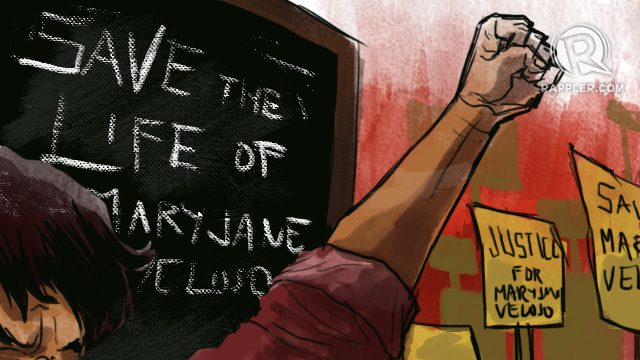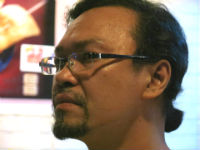SUMMARY
This is AI generated summarization, which may have errors. For context, always refer to the full article.

This is an open letter to my students:
Dear students,
I chose this day to write to you, because it is an historic moment for us as a people to reflect on what we can do and had done for our poor and disinherited fellow Filipino, Mary Jane Veloso. The efforts of people around the world, the unprecedented international solidarity displayed on a global scale, had played a major role in saving Mary Jane.
Moot or not, the people can claim their victory! The outpouring of protests is already a resounding victory for the people.
My dear students, you always engage me in class discussions on the futility of joining collective movements that seek social transformation. You had always been skeptical whenever I told you that our ultimate strength is our unity. Many of you prefer to be bystanders. As a sociologist, I always wonder about your skepticism. But I cannot completely blame you for feeling that way. Your families have taught you to value your career at the expense of the nation. Your schools have taught you to be docile students who pursue honor and excellence, rather than using honor and excellence to liberate people from the bondage of poverty. Your religion has socialized you to live for others, but it has emphasized the cultivation of your inner self. You have sophisticated gadgets which make you more intelligent than the young people of my generation, yet these technologies could not save you from drowning in the sea of information. You are left making your own subjective judgment, which you believe is the only true opinion.
My dear students, this is the reason why I want you to join activist student groups. In these movements, you will have the opportunity to realize the limits of your presumed omniscience, and to be confronted by other points of view.
Do not presume that activists who shout on the streets are simple-minded, puppet-like boisterous people, bereft of creative imagination. You are wrong. These people have convictions. Their convictions flow from the historical analysis that has been honed through arduous organizing and collective struggles. They are informed just like you. They have read a lot. But they have a different way of looking at reality. Whether you agree or disagree with them, exercise charity of interpretation. That is, do not assume you already know what they are fighting for.
They are not simply out on the streets to shout slogans. They would also prefer to pursue leisure somewhere else. But because they are activists, they do not have this luxury. They take time to attend endless meetings, planning, and assessments. But they believe that testing one’s beliefs in real struggle is the criterion of correct knowledge.
Of course, they also are normal and happy people, witty and humorous. Activism does not rob you of the ability to laugh simply because it demands thinking intelligently!
My dear students, follow the advice of the veteran American activist, Noam Chomsky. Start your day by reading the newspapers, but you also have to read the alternative media to dispel the illusions produced by the propaganda machine of the state. And this is the historic mission of liberal education in universities.
Liberal education, which is embedded in General Education, is supposed to “free” the mind from the mist of public opinion. Knowing the opinion of the public is a duty of every citizen, but the ruthless criticism of public opinion is the task of university education. Universities are potential breeding grounds for activists – they produce irreverent but educated individuals who have the courage to laugh at the Emperor who has no clothes!
Finally, my dear students, knowing what is to be done does not automatically impel you to commit and engage in activism. There are a lot of people who are well-informed about social problems, yet they choose to be chuckling pessimist hecklers. They either have surrendered to pessimism of the will, or have decided that there are more important values in life other than serving the people.
What has to give so that young people can be forced to choose to choose? Between knowing and doing there is a great cliff that has to be leaped. I believe this gap can only be sutured by love.
As Che Guevara once said, “At the risk of seeming ridiculous, let me say that the true revolutionary is guided by a great feeling of love.” In another occasion, he said to young people, “One must have a large dose of humanity, a large dose of a sense of justice and truth in order” to serve the people.
Large dose of humanity simply means large dose of love. Love cannot be taught. You have to encounter love in the wretched situation of the masses!
Immerse yourselves in the masses. This trait distinguishes activists from pure academics who write edicts from the unreachable heights of Mt Olympus.
In the end, what is exciting and challenging about activism is not the assurance of victory.
There will be lots of disappointment, sacrifice, and frustration, but activism is not a picnic in the park. Battles will be fought, you will lose some and win others. The road is rocky, dangerous, and stormy in many instances.
You may be forced stop during the journey. But, journeying together, nothing can stop us. For if we stop, we will suffer the same fate as when we refuse to fight.
It is better to have loved and lost, than to have loved but refused to struggle simply because of the fear of losing. Among activists, that is the greatest defeat. But fighting side-by-side with fellow activists who have found their salvation in other’s salvation will make your life meaningful. And if life is meaningful, then, we can endure all hardships!
As the old cliché among revolutionaries goes, “Dare to struggle, dare to win!” Or, I say, dare to take risk, dare to love!
Your comrade in the struggle,
Sir Gerry
This letter was written on April 29, 2015, the day a miracle happened – the execution of Mary Jane Veloso is indefinitely suspended. – Rappler.com
 Gerry Lanuza is a sociology professor at the University of the Philippines Diliman.
Gerry Lanuza is a sociology professor at the University of the Philippines Diliman.
Add a comment
How does this make you feel?
There are no comments yet. Add your comment to start the conversation.